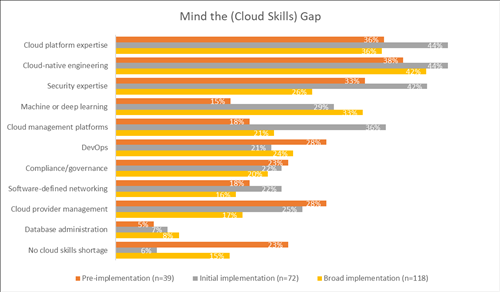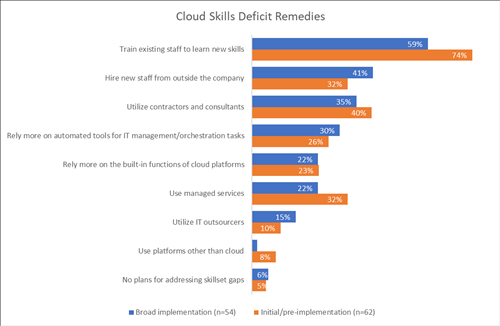Featured Topics
Featured Products
Events
S&P Global Offerings
Featured Topics
Featured Products
Events
S&P Global Offerings
Featured Topics
Featured Products
Events
S&P Global Offerings
Featured Topics
Featured Products
Events
Financial and Market intelligence
Fundamental & Alternative Datasets
Government & Defense
Professional Services
Banking & Capital Markets
Economy & Finance
Energy Transition & Sustainability
Technology & Innovation
Podcasts & Newsletters
Financial and Market intelligence
Fundamental & Alternative Datasets
Government & Defense
Professional Services
Banking & Capital Markets
Economy & Finance
Energy Transition & Sustainability
Technology & Innovation
Podcasts & Newsletters
Blog — 2 Mar, 2021
Introduction
In 2016, just over half of respondents reported cloud skills gaps related to the management and operation of their organizations' cloud IT environments. This year, 451 Research's Voice of the Enterprise (VotE): Cloud, Hosting & Managed Services, Organizational Dynamics 2020 (click here to read more) survey revealed that 85% of organizations reported deficits in cloud expertise. We attribute this increase to the expanded scale and complexity of cloud operations. The journey to the cloud now involves much more than simply lifting and shifting workloads from on-premises to public cloud environments.
Additional considerations include the mechanics of mass migrations, workload placement and optimization, application modernization/re-platforming, IT governance/management, hybrid/multicloud deployment, cloud-based security, and compliance. Access (or lack thereof) to talent will limit organizations' ability to effectively leverage cloud as part of their ongoing IT and business transformations.
The 451 Take
Very few organizations claim to be all set on the cloud skills front. As public cloud environments become embedded components of organizational IT, basic tasks such as resource provisioning and capacity management – as well as application-specific functions such as data analytics and machine learning – become features of the cloud providers' ever-expanding service portfolios, thus requiring continuous refreshes of cloud platform expertise. Cloud maturity is no protection from cloud skills shortages – in fact, the cloud-mature cohort is more likely to know what it doesn't know and becomes more aware of the 'unknown unknowns' as it embarks on cloud-native application refactoring and net-new application development. While gaps in specific cloud skills areas can be overcome via retraining, new hires or third-party assistance, the larger challenge lies in obtaining the expertise to integrate and manage highly heterogeneous IT estates and, as one 451 Alliance commentator put it, "expert generalists that understand how the whole thing works."
Cloud skills gaps: The ongoing saga
Organizations face an increasingly complex IT landscape. Heterogeneous IT estates are becoming more common and hybrid/multicloud is emerging as the organizing principle of enterprise IT. Transformation brings with it multiple challenges that must be dealt with concurrently, including updating legacy workloads and infrastructure while also developing application modernization strategies, building new applications deploying cloud-native tools and DevOps processes, and designing IT architectures ready to meet the demands of the digital economy.
The ability to manage and optimize complexity will be a key determinant of successful IT and business transformations. As cloud technology enters its teenage years, the focus has shifted from adoption and building toward leveraging and management. Cloud is simply becoming IT (instead of a separate special snowflake variation on IT), and clouds (on-premises and multiple off-premises hyperscale and sub-hyperscale suppliers) are now being incorporated into the broader IT mix, involving integration, management, orchestration and optimization. These are garden-variety IT skills, but it's the need to create unified IT estates out of multiple moving parts that complicates the skills and expertise landscape for organizations.
Cloud skills gaps persist because of cloud’s growing 'mainstream-ness,' the rapid pace of hyperscalers' feature/functionality development, and acceleration of both cloud migration and digital transformation initiatives. In 451 Research's VotE: Digital Pulse, Coronavirus Flash Survey from June, organizations reported accelerated activity in the areas of new digital transformation initiatives (25%), migration of workloads to the cloud (22%), and adoption of cloud-native software development practices (18%).
Cloud Skills Impact by Stage of Cloud Maturity

Source: Voice of the Enterprise: Cloud, Hosting & Managed Services: Organizational Dynamics 2020
Q. Which of the following skills categories are most acutely lacking when it comes to managing your organization’s cloud computing environment? Please select all that apply.
Cloud platform expertise remains one of the key skills gap areas, fueled by growth in the ranks of intermediate cloud-maturity cohort and, more broadly, the continuous expansion of the hyperscalers' collective service/feature portfolio, which currently stands at over two million individual SKUs. Additionally, the increased pressure to deliver and support applications across workload deployment venues means that organizations' IT operations and application developer shops may require expertise in multiple public clouds – AWS, Microsoft Azure, Google Cloud Platform, IBM Cloud – as well as on-premises private clouds (e.g., VMware, Dell, HPE).
On the cloud-native engineering skills front, organizations at all levels of cloud maturity are pretty much in the same boat, with expertise shortages being more or less uniform across categories. As we noted earlier this year, nearly 30% of organizations in the 'cloud mature' category are using cloud-native frameworks and tools across the bulk of their homegrown application estates – compared with single-digit percentages of organizations in the pre-implementation and intermediate stages of public cloud deployment. Cloud-native software development can also take place in on-premises infrastructure environments, but our research indicates that organizations get more cloud native as IaaS/public cloud becomes an increasingly important workload execution venue. Therefore, we expect that many organizations will be pursuing cloud-native expertise (and skilled personnel) for some time to come.
Closing the skills gap: Approaches vary
Organizations at various stages of cloud maturity also implement different go-to approaches to obtaining cloud expertise. While training existing staff to level up their cloud skills is the most common strategy, organizations in the initial/pre-implementation phases of cloud development are more likely to go this route (74%) than their cloud-mature counterparts (59%). Cloud-mature organizations have likely already gone down the 'retrain existing staff for new skills' road and found this approach wanting in certain areas, particularly for newer skills such as cloud-native technologies and machine learning that may not have had an on-premises equivalent in organizations' traditional IT environments. For the less-mature cloud crowd, retraining existing staff may suffice for a while as upskilling typically involves thinking about standard IT functions such as servers, storage and networking in a new 'cloudy' way.
A similar, though less-dramatic, pattern holds for the use of managed services to address the lack of in-house cloud skills – 32% of less-cloud-mature organizations adopt this approach compared with 22% of cloud veterans. New-to-cloud organizations may take the managed services approach to accelerate the pace of cloud implementation or bring in cavalry to assist with workload migrations or perform cleanup operations on haphazard solo flights to the cloud. The managed services usage pattern among cloud-mature organizations appears to be mostly about maintenance and operation of steady-state back-end workloads or workloads running on secondary public cloud supplier platforms.
Filling in the Cloud Skills Gap

Source: Voice of the Enterprise: Cloud, Hosting & Managed Services: Organizational Dynamics 2020
Q. How do you plan to address these skills shortages? Please select all that apply.
Base: Lacking important skills, abbreviated fielding
The staffing challenges emerging from the paradigm shift from traditional to cloud-based IT are the result of having to think about standard IT functions such as security and networking in a new way as well as having to bring in net-new skill sets. When asked about the types of skills most lacking in the cloud computing environment management arena, nearly 35% of respondents cited both cloud-centric IT specialist skills ('cloud specialists') and expertise in specific cloud computing platforms or vendor stacks.
